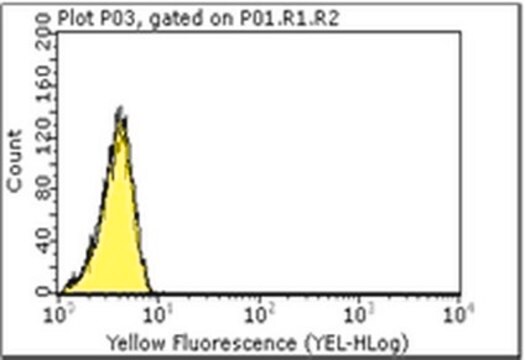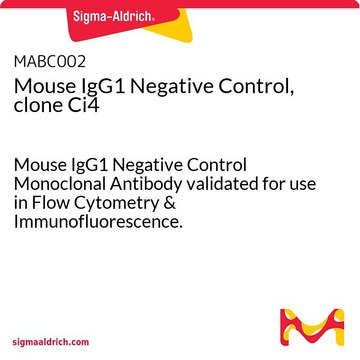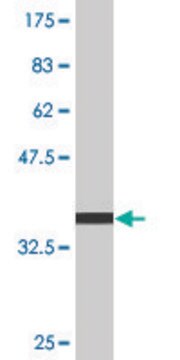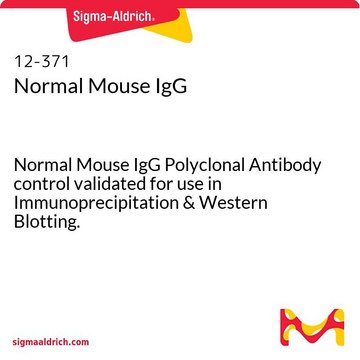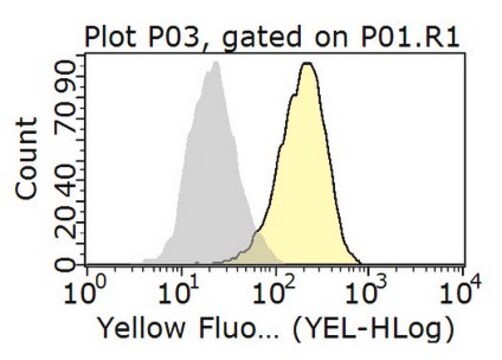MABF1081Z
Mouse IgG1-k Negative Control, clone MOPC-21, Azide Free Antibody
clone MOPC-21, from mouse
Sinônimo(s):
IgG1-k
Faça loginpara ver os preços organizacionais e de contrato
About This Item
Código UNSPSC:
12352203
eCl@ss:
32160702
NACRES:
NA.42
Produtos recomendados
fonte biológica
mouse
Nível de qualidade
forma do anticorpo
purified antibody
clone
MOPC-21, monoclonal
técnica(s)
flow cytometry: suitable
Isotipo
IgG1
modificação pós-traducional do alvo
unmodified
Descrição geral
The MOPC-21 immunoglobulin is useful as an isotype-matched control. The MOPC-21 immunolglobulin has an unknown binding specificity and is used as an isotype control for mouse IgG1 antibodies.
Imunogênio
Immunogen information for this antibody is proprietary information.
Aplicação
Research Category
Inflammation & Immunology
Inflammation & Immunology
Research Sub Category
Immunoglobulins & Immunology
Immunoglobulins & Immunology
This mouse monoclonal Mouse IgG1-k Negative Control, clone MOPC-21, Azide Free, Cat. No. MABF1081Z is validated for use in Flow Cytometry.
forma física
Affinity Chromatography
Format: Purified
Purified Mouse monoclonal containing 10 mM NaH2PO4, 150 mM NaCl, pH7.2. This monoclonal antibody was purified from tissue culture supernatant via affinity chromatography.
Armazenamento e estabilidade
Stable for 1 year at 2-8°C from date of receipt.
Note: It is recommended to store the product undiluted at 2-8°C and protected from prolonged exposure to light. Do not freeze.
Note: It is recommended to store the product undiluted at 2-8°C and protected from prolonged exposure to light. Do not freeze.
Outras notas
Concentration: Please refer to lot specific datasheet.
Exoneração de responsabilidade
Unless otherwise stated in our catalog or other company documentation accompanying the product(s), our products are intended for research use only and are not to be used for any other purpose, which includes but is not limited to, unauthorized commercial uses, in vitro diagnostic uses, ex vivo or in vivo therapeutic uses or any type of consumption or application to humans or animals.
Código de classe de armazenamento
12 - Non Combustible Liquids
Classe de risco de água (WGK)
nwg
Ponto de fulgor (°F)
Not applicable
Ponto de fulgor (°C)
Not applicable
Certificados de análise (COA)
Busque Certificados de análise (COA) digitando o Número do Lote do produto. Os números de lote e remessa podem ser encontrados no rótulo de um produto após a palavra “Lot” ou “Batch”.
Já possui este produto?
Encontre a documentação dos produtos que você adquiriu recentemente na biblioteca de documentos.
U Schönbeck et al.
The American journal of pathology, 155(4), 1281-1291 (1999-10-09)
Cyclooxygenase-1 (Cox-1) and Cox-2 convert arachidonic acid to prostaglandin H(2), the precursor of other prostaglandins and thromboxanes, eicosanoids important in vascular pathophysiology. However, knowledge of the expression of cyclooxygenases within atherosclerotic lesions is scant. This study tested the hypothesis that
J E Salmon et al.
The Journal of experimental medicine, 166(6), 1798-1813 (1987-12-01)
We report that phagocytosis by human neutrophils of Con A-treated erythrocytes (E-Con A) and nonopsonized Escherichia coli with mannose-binding adhesions is mediated by the Fc gamma receptor bearing the 3G8 epitope. Modulation of Fc receptors by pretreating with aggregated-IgG or
Eveliina Pollari et al.
Journal of neuroinflammation, 8, 74-74 (2011-06-30)
Granulocyte colony stimulating factor (GCSF) is protective in animal models of various neurodegenerative diseases. We investigated whether pegfilgrastim, GCSF with sustained action, is protective in a mouse model of amyotrophic lateral sclerosis (ALS). ALS is a fatal neurodegenerative disease with
Heidi Schwarzenbach et al.
International journal of cancer, 120(7), 1465-1471 (2007-01-06)
Tumor tissues, blood plasma and bone marrow (BM) aspirates of 57 prostate cancer patients (PCa) without clinical signs of overt metastases were assessed for LOH (loss of heterozygosity) by a PCR-based fluorescence microsatellite analysis, using a panel of 15 markers.
April J Beyer et al.
Environmental health perspectives, 115(3), 354-360 (2007-04-14)
Transgenic maize, which produces the nontoxic B subunit of the Escherichia coli heat-labile toxin (LT-B) in seed, has proven to be an effective oral immunogen in mice. Currently, there is considerable concern over accidental consumption of transgenic maize expressing LT-B
Nossa equipe de cientistas tem experiência em todas as áreas de pesquisa, incluindo Life Sciences, ciência de materiais, síntese química, cromatografia, química analítica e muitas outras.
Entre em contato com a assistência técnica